Level Up Your Marketing with Personalized Experiences
Stop generic marketing and start connecting with customers as individuals. Website personalization tools are key to boosting engagement and driving revenue. This list of 10 top website personalization tools—including OKZest, Optimizely, Dynamic Yield, RightMessage, Adobe Target, Klaviyo, Monetate (now part of Kibo), Insider, ConvertFlow, and Personyze—will help you find the perfect solution for tailoring your website content, email campaigns, and more. Discover how these tools solve the problem of one-size-fits-all marketing and learn which one best fits your needs.
1. OKZest
Boosting engagement and conversions through personalized visuals is a cornerstone of effective website personalization. OKZest stands out among website personalization tools by enabling you to dynamically generate unique images tailored to each individual user, without requiring any coding skills. Imagine sending emails where the banner image dynamically changes to feature each recipient's name, company logo, or even a product they recently viewed – OKZest makes this a reality. This level of visual personalization significantly enhances the user experience, making your message stand out in crowded inboxes and social media feeds. Whether you're an email marketer striving for higher open rates, a social media manager crafting compelling visuals, or a sales team personalizing outreach, OKZest offers a powerful way to captivate your audience and drive better results.
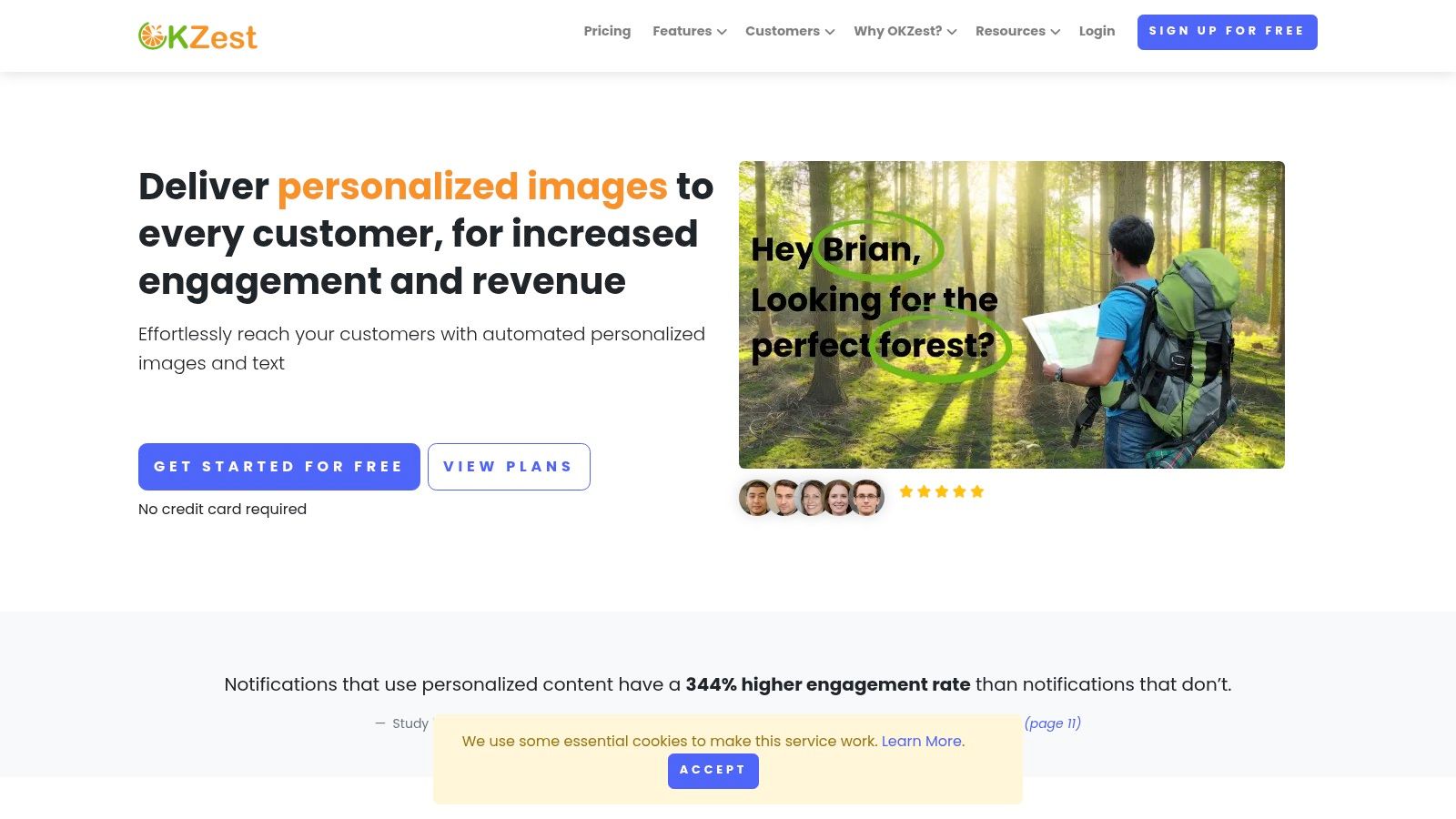
OKZest acts as a "merge tag" system for images, pulling data from your existing databases and APIs to populate image templates in real-time. Think of the possibilities: event organizers can generate personalized tickets with attendee names and unique QR codes, real estate agents can create property listings with dynamic mortgage calculations based on individual budgets, and recruiters can send personalized job offer letters with the candidate's name and company branding. This dynamic image generation significantly streamlines your workflow, eliminating the need for manual image creation for each recipient. Compatibility with 99% of Email Service Providers (ESPs), including major platforms like Mailchimp, Klaviyo, and Instantly, ensures seamless integration with your existing marketing tech stack. Further extending its reach, OKZest also supports personalized image generation for websites, chatbots, and social media direct messages, offering a comprehensive solution for visually personalized communication across multiple channels.
Pricing and Technical Requirements:
OKZest offers a tiered pricing structure, starting with a free plan that provides 2,500 images per month – perfect for smaller campaigns or testing the platform. Scalable plans are available for larger enterprises requiring millions of personalized images. While real-time personalization involves some setup and integration with your data sources, OKZest's user-friendly design tool and comprehensive support (including text and video chats) make the process manageable even for non-technical users.
Pros:
- Automates personalized image creation, accelerating campaign workflows and eliminating manual design work.
- Compatible with nearly all ESPs, simplifying integration with existing marketing tools.
- Supports dynamic and static data sources, including real-time API integration with fallback options.
- Flexible pricing from a free tier to enterprise-level plans, catering to businesses of all sizes.
- Built-in team and role management for collaborative workflows and streamlined operations.
Cons:
- The free plan's 2,500 image limit may restrict smaller campaigns beyond initial testing.
- Real-time personalization requires some technical setup, potentially presenting a learning curve for some users.
Website: https://okzest.com
OKZest's innovative approach to visual personalization makes it a valuable asset for anyone seeking to elevate their website personalization strategy. Its ease of use, combined with powerful features and broad compatibility, empowers businesses to create engaging, personalized experiences that resonate with their audience and drive tangible results. Its documented 344% engagement increase (OneSignal, 2024) serves as a testament to its efficacy in capturing attention and fostering stronger customer relationships.
2. Optimizely: Enterprise-Grade Website Personalization
Optimizely is a powerful website personalization tool and experimentation platform ideal for enterprise-level businesses looking to refine their digital experiences and maximize conversions. It goes beyond simple A/B testing, offering multivariate testing and robust personalization features, making it a strong contender among available website personalization tools. This platform empowers marketers to create dynamic, data-driven experiences tailored to individual visitor segments, ultimately driving engagement and achieving business goals.
How Optimizely Personalizes the Web Experience:
Optimizely's personalization solution utilizes a combination of behavioral data, demographics, and contextual information to deliver targeted content and offers. Imagine a scenario where a returning visitor browsing your e-commerce site has previously shown interest in running shoes. Optimizely can dynamically adjust the homepage to feature running shoe promotions, relevant blog posts about running, and even personalized product recommendations based on their past browsing history. This level of tailored content significantly increases the chances of conversion compared to a generic, one-size-fits-all approach. For another example, consider a SaaS company wanting to personalize website content for different industries. Optimizely can detect a visitor's industry based on their IP address or referral source and dynamically display case studies and testimonials relevant to their specific sector.
Key Features and Benefits:
- Visual Editor: No coding required! Optimizely's visual editor makes creating and implementing personalized experiences easy, even for non-technical users. Marketers can drag and drop elements, modify content, and preview changes in real-time.
- Advanced Targeting: Segment your audience based on a wide array of attributes, including location, behavior (pages visited, products viewed, etc.), demographics, referral source, and more. This granular control allows for highly targeted personalization.
- Integrated A/B Testing: Seamlessly integrate A/B testing to validate the effectiveness of your personalization campaigns. Compare different personalized experiences against a control group to determine which variation performs best.
- Machine Learning: Leverage Optimizely's machine learning capabilities to automate personalization and receive data-driven recommendations for optimizing your campaigns.
- Real-Time Analytics: Access comprehensive dashboards and reports to monitor performance, track key metrics, and gain valuable insights into user behavior.
Pros:
- Robust Capabilities: Optimizely provides a comprehensive suite of tools beyond just personalization, including experimentation and analytics, making it a valuable all-in-one platform.
- Statistical Rigor: The platform boasts a strong statistical engine, ensuring reliable experimentation results and data-driven decision-making.
- Excellent Support: Optimizely offers robust customer support and implementation services, ensuring a smooth onboarding process and ongoing assistance.
Cons:
- Higher Price Point: Optimizely’s enterprise-grade features come at a premium, making it potentially more expensive than some other website personalization tools. Contact their sales team for specific pricing.
- Complexity: While the visual editor simplifies many tasks, fully utilizing all of Optimizely's advanced features can require a learning curve and potentially some technical expertise.
- Resource Intensive: Advanced implementations may necessitate dedicated technical resources for setup and maintenance.
Implementation Tips:
- Start Small: Begin with a pilot project focusing on a specific user segment or website area. This allows you to test and refine your personalization strategy before scaling across your entire website.
- Clearly Define Goals: Identify the key metrics you want to improve (e.g., conversions, engagement, average order value) before implementing any personalization campaigns.
- Iterate and Optimize: Continuously monitor performance, analyze data, and make adjustments to your personalization strategies based on real-world results.
Why Optimizely Deserves its Place on the List:
Optimizely's comprehensive features, powerful experimentation capabilities, and enterprise-grade platform make it a top choice for businesses seeking advanced website personalization. While the higher price point and potential complexity may make it less suitable for smaller organizations or those with limited technical resources, the platform's robust capabilities and potential for significant ROI justify its position as a leading website personalization tool.
Visit Optimizely
3. Dynamic Yield
Dynamic Yield (acquired by Mastercard) empowers brands to create truly personalized digital experiences. This sophisticated platform leverages the power of AI and machine learning to tailor content, product recommendations, and offers across various channels, including web, mobile, email, and more. Instead of offering a one-size-fits-all approach, Dynamic Yield analyzes user behavior, preferences, and intent signals to dynamically adjust the experience for each individual. This allows businesses to optimize conversions, increase engagement, and foster stronger customer relationships.
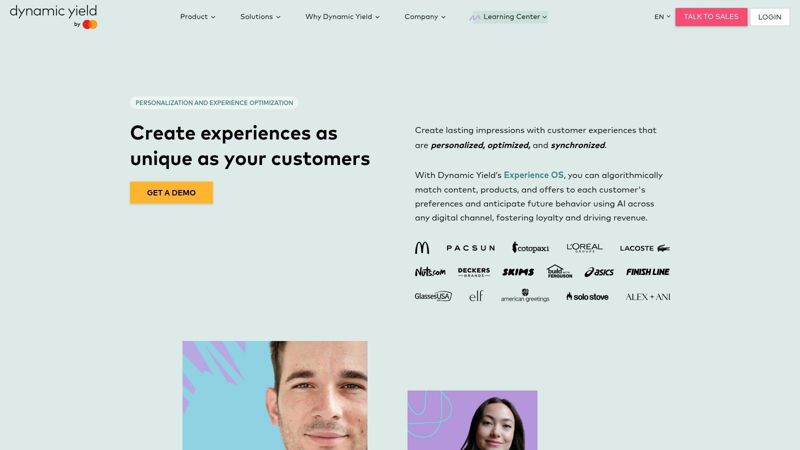
For example, imagine an email marketer wanting to boost click-through rates. With Dynamic Yield, they can personalize email content based on past interactions, purchase history, or even real-time browsing behavior. A social media manager can use the platform to tailor ad creatives and target specific audience segments with personalized messages. Similarly, sales teams can leverage Dynamic Yield to recommend relevant products and offers on a website, increasing the likelihood of a conversion. Learn more about Dynamic Yield and see how dynamic content can transform user experience. The range of applications across various marketing disciplines makes Dynamic Yield a powerful website personalization tool.
Dynamic Yield's robust feature set includes an AI-powered recommendation engine with multiple algorithms, a unified customer data platform for cross-channel personalization, automated experience optimization with predictive targeting, a visual experience builder with a drag-and-drop interface, and advanced segmentation and audience management capabilities. These features work in concert to provide a comprehensive solution for delivering truly personalized experiences.
Pros:
- Powerful AI-driven personalization: Dynamic Yield's sophisticated algorithms enable highly accurate targeting and personalized experiences.
- Omnichannel approach: Covers web, app, email, and other digital touchpoints, providing a consistent and personalized experience across the customer journey.
- Intuitive user interface: The drag-and-drop interface makes it easy to create and manage personalized experiences without requiring extensive technical expertise.
- Robust reporting and analytics: Provides detailed insights into campaign performance, allowing businesses to continuously optimize their personalization strategies.
Cons:
- Premium pricing: Dynamic Yield's robust capabilities come at a cost, which may be prohibitive for smaller businesses.
- Implementation time investment: Integrating Dynamic Yield and configuring it for optimal performance can require a significant time investment.
- Advanced features may require developer support: While the basic interface is user-friendly, some advanced features may necessitate the involvement of developers.
Dynamic Yield deserves its place on this list because it offers a comprehensive and powerful suite of personalization tools. While the premium pricing may make it more suitable for enterprise-level businesses, its ability to deliver true omnichannel personalization and its advanced AI-driven capabilities make it a standout choice among website personalization tools. You can explore their offerings further on their website: https://www.dynamicyield.com/
4. RightMessage
RightMessage stands out among website personalization tools by catering specifically to the needs of small to medium-sized businesses and entrepreneurs. It simplifies the often complex process of personalization, making it accessible even without deep technical expertise. This allows marketers to focus on crafting targeted messages and optimizing conversions rather than wrestling with complicated software. By utilizing visitor attributes, observed behavior, and pre-defined segments, RightMessage empowers you to tailor calls-to-action (CTAs), content, and forms, ultimately leading to a more engaging and effective user experience. This targeted approach resonates well with specific audiences, increasing engagement and conversion rates. This is especially beneficial for businesses looking to maximize their marketing ROI without a large technical team.
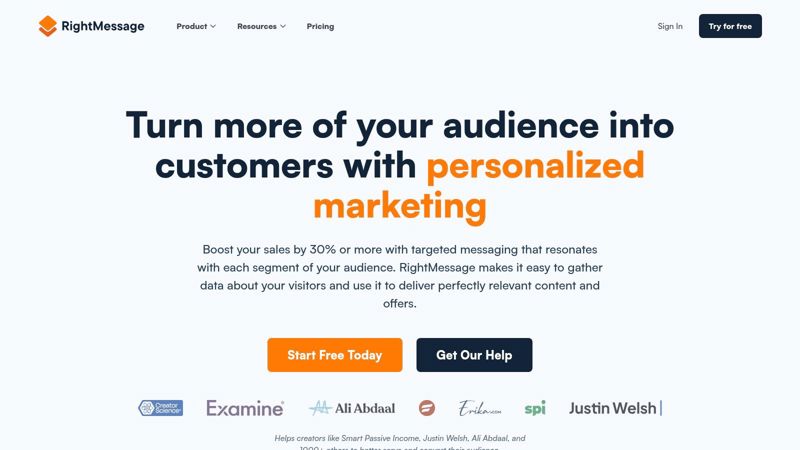
For email marketers, RightMessage offers a powerful way to segment your audience and deliver hyper-relevant email campaigns. Imagine presenting lead magnet offers specifically tailored to the visitor's industry or displaying case studies that align with their expressed interests. Social media managers can leverage RightMessage to customize landing page experiences for different campaign audiences, boosting conversion rates. Consultants and coaches can personalize their websites to speak directly to the pain points of different client segments, showcasing relevant testimonials and service packages. Sales teams benefit from website personalization by pre-qualifying leads and tailoring the sales message based on visitor data. Even real estate agents and recruiters can leverage RightMessage to personalize property listings or job postings based on visitor preferences.
RightMessage excels through its intuitive visual editor, simplifying the personalization setup process. It utilizes non-intrusive micro-surveys to gather visitor data for profiling, allowing for more accurate segmentation and personalized experiences. The platform integrates with popular CRM and email marketing platforms, enabling a streamlined workflow and enhanced campaign effectiveness.
Key Features:
- Simple Personalization Setup: The visual editor makes creating personalized experiences drag-and-drop simple, minimizing the technical learning curve.
- Visitor Profiling: Non-intrusive micro-surveys collect valuable visitor data, enabling targeted content delivery and personalized experiences.
- CRM & Email Marketing Integrations: Seamless integration with your existing marketing stack improves efficiency and data utilization.
- Segment-Based Content Customization: Tailor content and offers to specific audience segments based on demographics, behavior, or interests.
- Personalized Call-to-Action Modules: Dynamically adjust CTAs based on visitor profiles, encouraging higher click-through and conversion rates.
Pros:
- User-Friendly Interface: Designed specifically for marketers, even those without coding experience.
- Affordable Pricing: A cost-effective alternative to complex enterprise solutions.
- Quick Implementation: Get started quickly without needing developer assistance.
- Effective Email List Segmentation: Gather valuable data and segment your audience for more targeted email campaigns.
Cons:
- Limited Advanced Features: Fewer advanced features compared to more robust enterprise platforms.
- Not Ideal for Large-Scale E-commerce: May not be the best solution for complex e-commerce personalization needs.
- Fewer Native Integrations: While integrations exist, they are not as extensive as some larger platforms.
Website: https://rightmessage.com/
RightMessage deserves a place on this list because it democratizes website personalization, bringing its power to businesses of all sizes. While enterprise-level solutions may offer more advanced features, RightMessage provides an accessible and effective entry point for those looking to enhance their website engagement and conversions without the hefty price tag or technical hurdles. For small to medium-sized businesses and entrepreneurs, RightMessage provides the perfect balance of power and simplicity in website personalization. Implementation is straightforward; simply embed the RightMessage snippet on your website and start creating personalized experiences through the visual editor.
5. Adobe Target
Adobe Target, a cornerstone of the Adobe Experience Cloud, stands as a robust website personalization tool empowering businesses to craft highly targeted and individualized digital experiences. It goes beyond simple personalization, offering advanced testing and optimization features to ensure your efforts yield maximum impact. This sophisticated platform leverages the power of Adobe Sensei, Adobe's AI and machine learning technology, to automate the delivery of personalized content across websites, mobile apps, and other digital touchpoints, making it an ideal choice for enterprises seeking a comprehensive personalization solution.
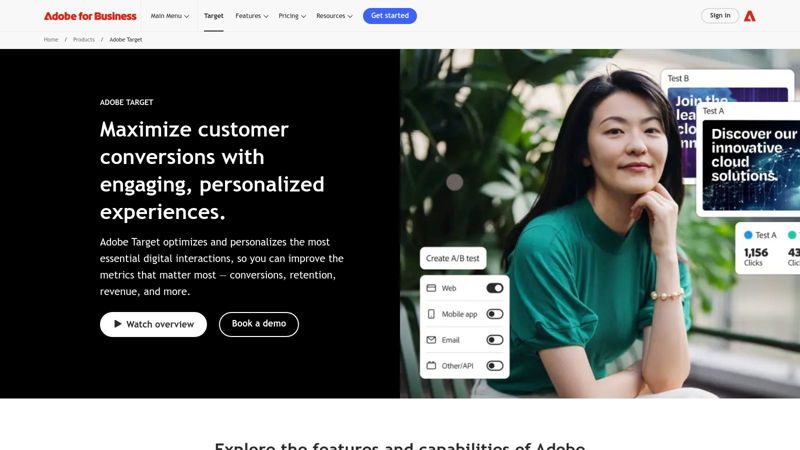
For instance, imagine an e-commerce business using Adobe Target. They could personalize product recommendations based on past browsing history, display targeted promotions to specific customer segments, and even tailor the website's layout and navigation based on user behavior. A real estate agent could use Adobe Target to showcase properties that align with individual client preferences, while a recruiter could personalize job recommendations based on a candidate's skills and experience. The possibilities are vast, making it a powerful website personalization tool for a variety of professionals, from email marketers and social media managers to sales teams and consultants. Learn more about Adobe Target for practical applications in marketing personalization.
Adobe Target’s key features contribute significantly to its robust personalization capabilities:
- AI-powered Automation: Automate personalization at scale with Adobe Sensei. This removes the manual burden of creating individual experiences, allowing you to efficiently target a larger audience.
- Visual Experience Composer: Empower non-technical users to create and modify personalized experiences without needing to write code, streamlining the workflow.
- Advanced Audience Segmentation and Targeting: Define highly specific audience segments based on demographics, behavior, and other criteria, enabling precisely targeted campaigns.
- Seamless Integration: Integrate smoothly with other Adobe Experience Cloud products, creating a cohesive marketing ecosystem.
- Enterprise-Level Testing: Conduct A/B and multivariate tests to optimize content and maximize conversions.
While Adobe Target is a powerful tool, it’s crucial to understand its advantages and disadvantages:
Pros:
- Comprehensive enterprise-grade solution: Provides a complete suite of tools for personalization, testing, and optimization.
- Deep integration: Works seamlessly with other Adobe analytics and marketing tools, allowing for a holistic view of customer data.
- Powerful AI capabilities: Leverages Adobe Sensei for advanced automation and insights.
- Extensive customization: Offers flexibility for complex implementations and unique business needs.
Cons:
- High cost: Requires a significant financial investment, making it less accessible to smaller businesses.
- Steep learning curve: Can be challenging for new users to master due to the platform's complexity.
- Resource intensive: Often requires dedicated resources to manage effectively.
- Complex implementation: Can be challenging to set up and configure, especially for organizations without technical expertise.
Unfortunately, specific pricing information for Adobe Target isn't publicly available and requires contacting Adobe for a tailored quote. Technical requirements will also vary based on the specific implementation. However, it’s important to note that deploying Adobe Target often necessitates collaboration with Adobe consultants or experienced implementation partners.
Compared to simpler website personalization tools, Adobe Target’s comprehensive features and enterprise-grade capabilities place it in a different league. While solutions like Optimizely offer strong A/B testing functionality and some personalization features, they often lack the depth of integration and advanced AI capabilities offered by Adobe Target. This makes Adobe Target a top choice for large organizations with complex personalization needs and the resources to manage a sophisticated platform. However, smaller businesses or those with limited budgets may find other website personalization tools more suitable.
6. Klaviyo: E-commerce Personalization Powerhouse
While primarily known for its email marketing prowess, Klaviyo is a strong contender among website personalization tools, especially for e-commerce businesses. It seamlessly integrates with platforms like Shopify, BigCommerce, and Magento, allowing you to leverage valuable customer data to create highly targeted and personalized on-site experiences. This translates to increased conversions, improved customer loyalty, and ultimately, a healthier bottom line. Klaviyo empowers you to deliver dynamic content, personalized product recommendations, and timely pop-ups based on individual customer segments and behaviors. This makes it an excellent choice for online retailers looking to enhance their customer journey and maximize their marketing ROI.
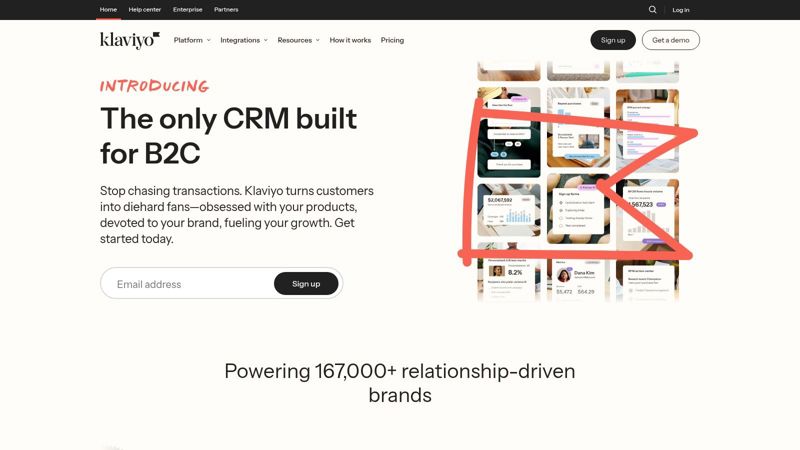
Imagine a customer browsing your online shoe store. They've previously purchased running shoes. Using Klaviyo, you can dynamically display a banner showcasing new arrivals in running shoes or related accessories like running socks or insoles. Alternatively, if a customer abandons their cart with a pair of hiking boots, a personalized popup offering a small discount or free shipping could entice them to complete the purchase. These are just a few examples of how Klaviyo's website personalization features can boost your e-commerce performance.
Klaviyo's unified customer profiles combine email, SMS, and website behavior data, offering a holistic view of each customer. This allows for highly segmented targeting, enabling you to tailor your messaging and offers with pinpoint accuracy. Features like personalized product recommendations, based on past purchases and browsing history, can significantly increase average order value and customer lifetime value. For instance, if a customer frequently purchases organic skincare products, Klaviyo can recommend similar items or complementary products from the same category.
Features:
- E-commerce focused personalization with deep integration to platforms like Shopify, BigCommerce, and Magento
- Behavioral targeting based on purchase history and browsing behavior
- Personalized product recommendations for increased conversions
- Dynamic content blocks that change based on customer segments
- Unified customer profiles combining email, SMS, and website behavior
Pros:
- Excellent for e-commerce businesses with direct integration to major platforms
- Combines email, SMS, and on-site personalization in one platform
- Strong data analytics capabilities
- User-friendly interface with pre-built templates
Cons:
- Pricing scales with contact list size and can become expensive
- Website personalization features are more limited than dedicated website personalization solutions like Dynamic Yield or Optimizely.
- Primarily focused on e-commerce use cases, making it less suitable for other industries.
Implementation Tips:
- Integrate deeply with your e-commerce platform: Take full advantage of Klaviyo's integrations to capture valuable customer data.
- Segment your audience effectively: Create targeted segments based on purchase history, browsing behavior, and other relevant factors.
- A/B test your personalized content: Experiment with different messaging and offers to optimize your conversion rates.
- Utilize pre-built templates and flows: Leverage Klaviyo's resources to streamline your setup and implementation process.
Website: https://www.klaviyo.com/
Klaviyo earns its spot on this list because it offers a robust, albeit e-commerce focused, suite of website personalization tools integrated within a powerful marketing automation platform. While the pricing might be a consideration for smaller businesses, the comprehensive features and direct e-commerce integrations make it a compelling choice for online retailers looking to elevate their personalization efforts. If you're already using Klaviyo for email marketing, exploring its website personalization capabilities is a logical next step. However, businesses outside of e-commerce or those requiring extremely granular website personalization controls may want to consider dedicated website personalization platforms.
7. Monetate (now part of Kibo)
Monetate, now integrated into Kibo's comprehensive personalization suite, offers a robust solution for businesses, particularly in the e-commerce and retail sectors, looking to elevate their website personalization efforts. If you're aiming for true 1-to-1 personalization at scale, Monetate deserves a place on your list of website personalization tools to consider. This powerful platform leverages AI-driven technology to deliver individualized experiences across various digital touchpoints, helping businesses maximize conversions and foster customer loyalty.
One of Monetate's key strengths lies in its sophisticated AI engine. This engine uses predictive algorithms to anticipate customer behavior and tailor experiences accordingly. Imagine a customer browsing your online store. Monetate can analyze their past purchases, browsing history, and real-time behavior to dynamically recommend products they're most likely to be interested in, increasing the chances of a sale. This goes beyond basic product recommendations; Monetate allows for personalized content, promotions, and even website navigation.
For email marketers, this integration can be incredibly powerful. By connecting Monetate with your email marketing platform, you can personalize email content based on individual customer profiles and website activity. Imagine sending an abandoned cart email with a personalized discount on the specific items left behind, or tailoring product recommendations within the email based on recent browsing history. This level of personalization drastically increases email engagement and conversion rates.
Social media managers and influencer marketers can also benefit from Monetate's capabilities. By understanding customer preferences and behavior, these professionals can create more targeted and effective social media campaigns. They can personalize ad creatives, landing pages, and even the timing of their social media posts to maximize impact.
Monetate's visual editor simplifies the creation of personalized experiences. Even without extensive technical expertise, marketing teams can easily design and implement dynamic content variations, A/B tests, and personalized campaigns. This user-friendly interface empowers marketers to take control of their personalization strategy without relying heavily on developers.
Key Features:
- 1-to-1 Personalization using Predictive Algorithms: Delivers truly individualized experiences based on customer behavior and preferences.
- Visual Editor: Empowers marketers to easily create and manage personalized content without coding.
- Product Recommendations: Offers various algorithm options for tailored product suggestions.
- Automated Segment Discovery: Uses machine learning to identify hidden customer segments for more targeted campaigns.
- Cross-Device and Cross-Session Personalization: Maintains consistent personalized experiences across different devices and browsing sessions.
Pros:
- Strong Focus on Retail and E-commerce: Tailored features and functionalities for online businesses.
- Powerful Machine Learning Algorithms: Automates optimization and improves personalization effectiveness over time.
- Intuitive Interface: Requires minimal technical skills to operate.
- Detailed Analytics and Attribution Reporting: Provides valuable insights into campaign performance and ROI.
Cons:
- Higher Price Point: Better suited for mid-market to enterprise-level businesses. Contact Kibo directly for specific pricing information.
- Setup Time: Requires initial investment in setup and configuration to maximize its potential.
- Advanced Features: Some advanced functionalities might require technical support for implementation.
Implementation Tips:
- Start with Clear Goals: Define your personalization objectives before implementation.
- Integrate with Existing Systems: Connect Monetate with your CRM, email marketing platform, and other relevant systems to leverage existing data.
- Leverage the Visual Editor: Use the visual editor to create and manage personalized experiences efficiently.
- Monitor and Analyze Results: Regularly track campaign performance and make adjustments based on data insights.
Compared to other website personalization tools, Monetate stands out with its advanced AI capabilities and focus on 1-to-1 personalization. While tools like Optimizely and Dynamic Yield offer similar functionalities, Monetate’s strength lies in its sophisticated algorithms and robust platform specifically designed for e-commerce.
For businesses serious about delivering highly personalized experiences, Monetate, now part of Kibo, offers a powerful solution worth exploring. Visit their website at https://kibocommerce.com/ for more information.
8. Insider
Insider distinguishes itself as a robust website personalization tool within a broader AI-powered growth management platform. It goes beyond basic website personalization by offering marketers the ability to create cohesive and individualized experiences across multiple channels, including web, mobile apps, email, and messaging platforms. This cross-channel approach is crucial for today's customer journey, which often spans various touchpoints. For businesses seeking a comprehensive solution, Insider's ability to orchestrate and personalize these interactions makes it a powerful contender among website personalization tools.

One of Insider's key strengths lies in its predictive segmentation capabilities, powered by AI. This allows marketers to move beyond simple demographic segmentation and anticipate user behavior, leading to more effective targeting. For example, an e-commerce business can use Insider to identify users likely to abandon their carts and proactively trigger personalized emails or web messages offering discounts or free shipping to incentivize purchase completion. This predictive capability extends to other channels as well, allowing for consistent messaging and personalized experiences throughout the customer lifecycle. Real-time personalization further enhances this by adapting to current and historical user behavior, delivering the right message at the right moment.
Insider provides a user-friendly interface with a visual journey builder, making it accessible even to those without extensive technical expertise. Its template library offers pre-built personalization scenarios for common use cases, accelerating the implementation process. For instance, email marketers can leverage pre-designed templates for welcome series, abandoned cart reminders, or product recommendations, tailoring them further with personalized content. This feature is especially valuable for marketing agencies managing multiple clients or social media managers juggling various campaigns. Consultants and coaches can similarly leverage Insider to segment their audience and deliver personalized content based on individual needs and goals.
While Insider offers a comprehensive suite of features, it’s important to consider the potential drawbacks. Pricing can be a significant factor, particularly for businesses requiring the full range of functionalities. Some advanced features may necessitate technical implementation, and integrations with certain platforms might involve custom development. However, Insider’s global presence and localized support in multiple regions can mitigate these challenges by providing assistance during implementation and ongoing operation.
Key Features and Benefits for Specific Audiences:
- Email Marketers: Automated personalized email campaigns, A/B testing, and detailed analytics.
- Marketing Agencies: Scalable platform for managing multiple clients, cross-channel campaign orchestration.
- Social Media Managers: Integration with social media platforms for targeted advertising and personalized messaging.
- Event Organizers: Personalized event invitations, reminders, and follow-up communications.
- Consultants and Coaches: Segmented communication based on client needs and personalized content delivery.
- Sales Teams: Lead nurturing and personalized sales outreach based on prospect behavior.
- Influencer Marketers: Identify and engage with relevant influencers through personalized outreach.
- Real Estate Agents: Targeted property recommendations and personalized communication with potential buyers.
- Recruiters: Personalized candidate engagement and automated recruitment workflows.
Insider's comprehensive approach to personalization makes it a valuable tool for businesses looking to enhance customer engagement and drive conversions. While the cost and potential technical requirements should be considered, the platform’s robust capabilities and user-friendly interface make it a strong option for those seeking advanced website personalization within a broader cross-channel strategy. You can explore their offerings further on their website: https://useinsider.com/.
9. ConvertFlow
ConvertFlow is a powerful website personalization tool specifically designed for marketers looking to boost conversions. It empowers you to create targeted calls-to-action (CTAs), forms, surveys, and other conversion-focused elements, tailoring the user experience based on visitor attributes, behavior, and their stage in the customer journey. This platform distinguishes itself through its no-code approach, making sophisticated personalization accessible even without developer assistance. This makes it a valuable asset among website personalization tools for those seeking quick and effective conversion optimization.
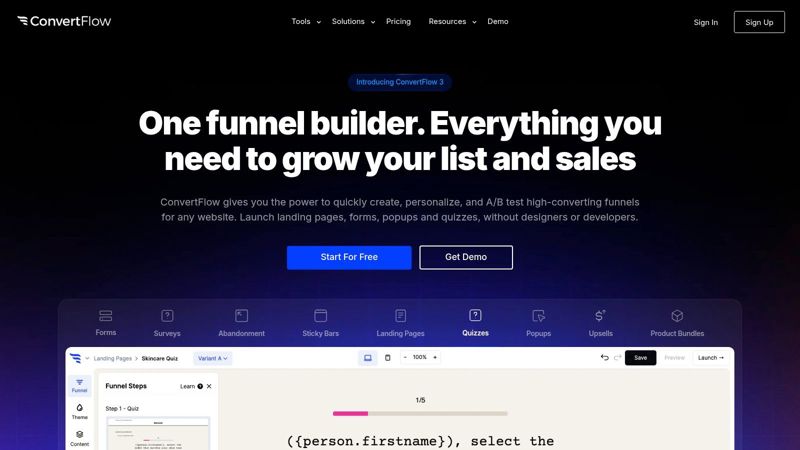
Imagine a scenario where a first-time visitor to your website sees a pop-up offering a free ebook, while a returning customer is presented with a personalized product recommendation or a special discount. This is the kind of targeted engagement ConvertFlow allows you to easily implement. For email marketers, this translates to highly segmented signup forms; for social media managers, it means creating personalized website experiences based on referral source. Event organizers can tailor registration forms based on past attendance, while consultants and coaches can personalize lead magnets according to visitor behavior. Sales teams benefit from targeted CTAs that nudge prospects towards conversion, and recruiters can customize job application forms based on candidate profiles. Even real estate agents can leverage ConvertFlow to show personalized property listings based on user preferences.
ConvertFlow offers a visual builder, eliminating the need for coding, allowing you to quickly craft personalized CTAs and forms. It supports conditional content display based on visitor segments you define, allowing for a highly tailored experience. You can build multi-step conversion funnels with personalized steps at each stage, optimizing the entire user journey. A/B testing functionalities let you refine your personalized experiences, ensuring maximum impact. Critically, ConvertFlow integrates with major CRM and email marketing platforms, ensuring seamless data flow and efficient lead management.
Features:
- Visual builder for creating personalized CTAs and forms
- Conditional content display based on visitor segments
- Multi-step conversion funnels with personalization
- A/B testing of personalized experiences
- Integration with major CRM and email marketing platforms
Pros:
- Extremely user-friendly interface requiring no coding
- Quick implementation with easy-to-use templates
- Affordable pricing compared to enterprise solutions
- Strong focus on conversion optimization
Cons:
- More limited in scope than full personalization platforms (focused on conversion elements rather than full-page personalization)
- Limited advanced segmentation compared to enterprise tools
Website: https://www.convertflow.com/
Implementation Tips:
- Start with a clear conversion goal in mind. Define the specific actions you want visitors to take.
- Utilize ConvertFlow's pre-built templates to quickly get started and customize them to match your branding and target audience.
- Leverage the conditional logic to personalize content based on visitor behavior and attributes. Experiment with different targeting criteria to optimize your campaigns.
- Integrate ConvertFlow with your existing CRM and email marketing platforms to streamline lead capture and nurturing.
ConvertFlow’s user-friendly interface and focus on conversion optimization make it a valuable website personalization tool, especially for marketers and businesses seeking to enhance lead generation and improve conversion rates without complex coding. While it may not offer the expansive features of full-scale personalization platforms, its targeted functionality makes it a highly effective solution for optimizing key conversion points across your website.
10. Personyze
Personyze secures its spot on this list of top website personalization tools because of its comprehensive approach. It offers a robust all-in-one platform combining real-time analytics, segmentation, A/B testing, and diverse personalization capabilities. This means marketers can move beyond basic personalization and create dynamic experiences that resonate deeply with individual visitors. Think targeted content, product recommendations tailored to browsing history, and even personalized search results – all within a single platform. This makes it particularly attractive for businesses seeking a powerful yet centralized solution for their website personalization efforts. Personyze excels at connecting website activity with personalized email campaigns, further strengthening customer engagement. This allows for a unified and consistent brand experience across different touchpoints.
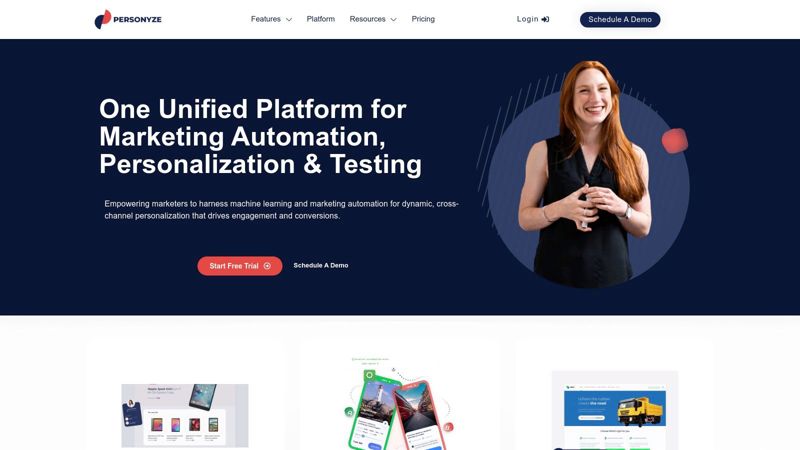
For e-commerce businesses, Personyze's AI-powered product recommendations are a game-changer. The platform analyzes visitor behavior in real-time, suggesting products they are most likely to purchase. This level of personalization can significantly boost conversion rates and average order value. Imagine a customer browsing running shoes; Personyze can instantly recommend related accessories like socks or performance trackers, creating a personalized shopping journey. Similarly, for businesses with complex websites, the personalized search functionality ensures visitors find exactly what they're looking for, improving user experience and reducing bounce rates. Content marketers can leverage Personyze to display dynamic content tailored to individual visitor segments. For example, returning visitors might see different content compared to first-time visitors.
While Personyze offers a rich feature set suitable for various personalization needs, including email integration that syncs with website behavior, it's worth noting that the user interface isn't as modern as some competitors. There's a learning curve, especially for users new to website personalization. Some features, particularly more advanced configurations, may require some technical implementation. However, Personyze provides dedicated customer support and implementation assistance to help businesses navigate these challenges. Learn more about Personyze in relation to personalized chatbot implementation, which can be a powerful addition to your website personalization strategy. This can be particularly useful for event organizers, consultants and coaches, real estate agents, and recruiters who want to provide instant, tailored support to potential clients.
Personyze offers flexible pricing options catering to businesses of different sizes, although specific details aren't readily available on their website. Potential users are encouraged to contact Personyze directly for a tailored quote based on their specific needs and usage requirements. Implementing Personyze typically involves integrating a JavaScript snippet into your website’s code. While basic setup can be relatively straightforward, more complex personalization strategies might require collaboration with developers. It's a valuable website personalization tool for businesses looking for a comprehensive solution, particularly those focused on e-commerce and improving user experience through targeted content and product recommendations. This makes it a powerful tool for marketing agencies, social media managers, sales teams, and influencer marketers seeking to enhance their online presence and drive conversions.
Top 10 Website Personalization Tools Comparison
| Product | Core Features/Characteristics | User Experience/Quality Metrics | Value Proposition & Pricing | Target Audience 👥 | Unique Selling Points ✨ |
|---|---|---|---|---|---|
| 🏆 OKZest | Automates personalized image creation, no-code, API | ★★★★☆ 344% engagement increase | 💰 Free to enterprise, scalable, team collaboration | Coaches, marketers, agencies, sales, nonprofits | Merge tags for images, 99% ESP compatibility, real-time API data with fallback |
| Optimizely | A/B & multivariate testing, audience targeting, ML | ★★★★☆ Enterprise-grade, robust stats | 💰 Higher price, enterprise-focused | Enterprise marketers seeking experimentation | Machine learning powered, analytics dashboards |
| Dynamic Yield | AI-powered personalization, cross-channel, drag-drop | ★★★★☆ Intuitive, robust analytics | 💰 Premium pricing | Mid-large brands, omnichannel marketers | Unified data platform, predictive targeting |
| RightMessage | Personalization for SMBs, visual editor, visitor profiling | ★★★☆☆ User-friendly, quick setup | 💰 Affordable | SMBs, entrepreneurs, email marketers | Micro-surveys, segmentation, personalized CTAs |
| Adobe Target | AI-personalization at scale, testing, segmentation | ★★★★☆ Enterprise-grade, powerful AI | 💰 Expensive, complex | Large enterprises, Adobe users | Adobe Sensei AI, deep Adobe integration |
| Klaviyo | E-commerce personalization, behavioral targeting | ★★★★☆ User-friendly, strong analytics | 💰 Pricing scales with contacts | E-commerce businesses | Email + SMS + on-site personalization |
| Monetate (Kibo) | 1-to-1 AI personalization, visual editor, product recs | ★★★★☆ Intuitive, detailed analytics | 💰 Mid-market to enterprise pricing | Retail & e-commerce marketers | Automated segment discovery, cross-device |
| Insider | AI-driven cross-channel personalization, predictive segs | ★★★★☆ Visual journey builder | 💰 Higher price for full features | Global marketers, multi-channel growth teams | Real-time personalization, template library |
| ConvertFlow | Personalized CTAs, forms, surveys, no coding needed | ★★★☆☆ Very user-friendly, fast setup | 💰 Affordable | Marketers focused on conversion | Multi-step funnels, A/B testing |
| Personyze | Real-time personalization, AI product recs, segmentation | ★★★☆☆ Flexible, comprehensive feature | 💰 Flexible pricing | Various business sizes, data-driven marketers | Personalized search, email sync |
Choosing the Right Website Personalization Tool
Finding the perfect website personalization tool from the myriad of options available can feel overwhelming. This article explored ten powerful solutions, ranging from versatile platforms like OKZest, Optimizely, and Dynamic Yield to more specialized tools like RightMessage and Klaviyo, each catering to different needs and budgets. We also examined enterprise-grade options such as Adobe Target and Monetate (now part of Kibo), as well as user-friendly solutions like Insider, ConvertFlow, and Personyze. Remember, the ideal website personalization tool aligns seamlessly with your existing marketing stack, integrates smoothly with your current workflows, and provides the level of customization necessary to reach your specific marketing objectives.
Key takeaways when choosing your website personalization tool include considering your budget, the technical expertise within your team, and the complexity of the personalization you want to implement. For smaller businesses or those just starting out, a more intuitive platform with pre-built templates might be the best option. Larger enterprises with more complex needs may require a robust solution that allows for granular control and advanced segmentation. Many website personalization platforms also leverage the power of SMS marketing to engage users in real-time. To learn more about how to use automated text messages to improve your customer experience and streamline operations, check out this comprehensive guide from CartBoss. By carefully weighing these factors, you can confidently select the website personalization tools that will empower you to create highly targeted and engaging experiences, ultimately driving conversions and fostering customer loyalty.
Ready to start personalizing your website and creating tailored experiences that resonate with your audience? Explore OKZest, a powerful website personalization tool designed to help you convert visitors into loyal customers through targeted messaging and customized content experiences. Streamline your personalization efforts and start seeing results today.